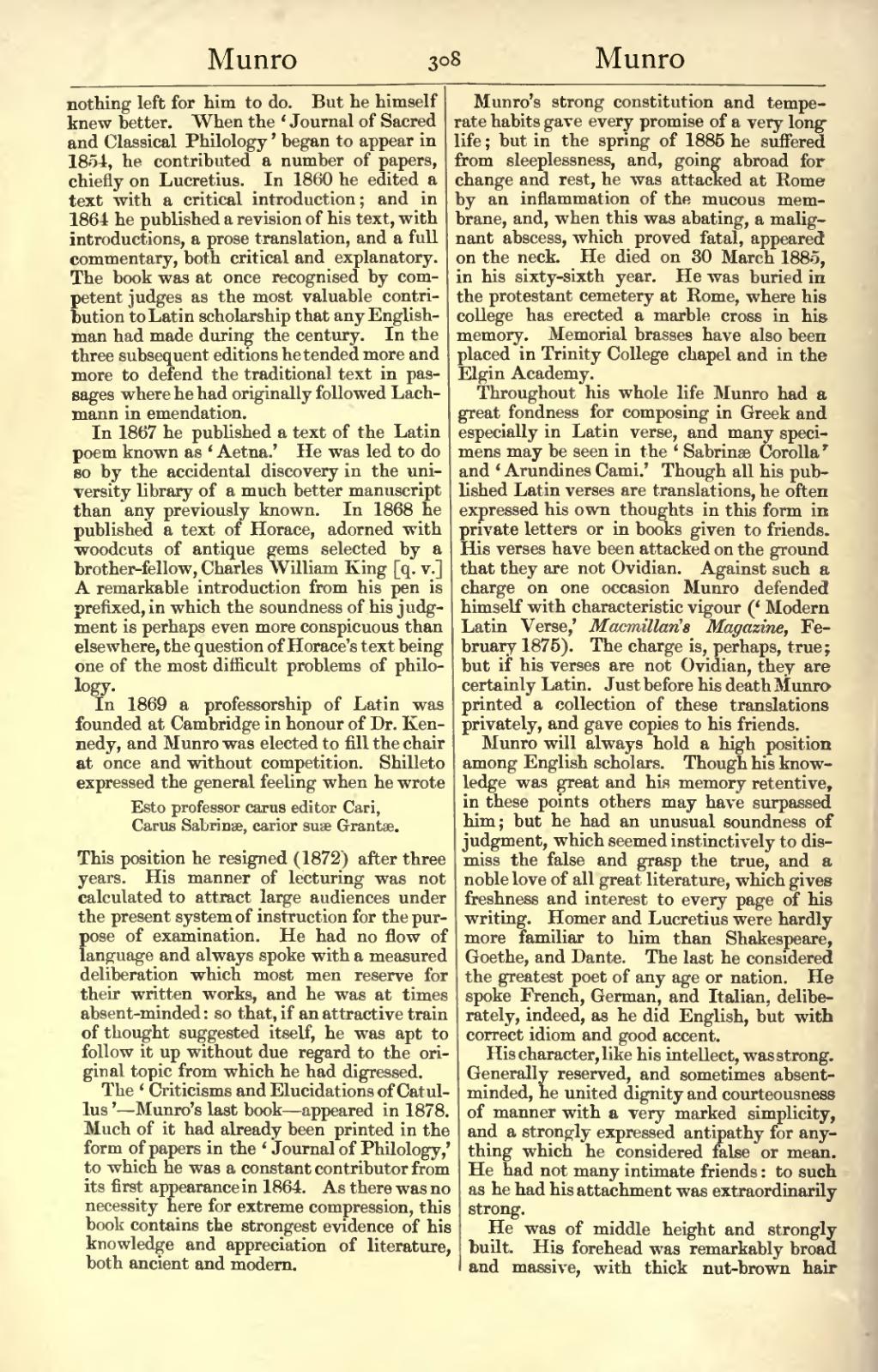nothing left for him to do. But he himself knew better. When the ‘Journal of Sacred and Classical Philology’ began to appear in 1854, he contributed a number of papers, chiefly on Lucretius. In 1860 he edited a text with a critical introduction; and in 1864 he published a revision of his text, with introductions, a prose translation, and a full commentary, both critical and explanatory. The book was at once recognised by competent judges as the most valuable contribution to Latin scholarship that any Englishman had made during the century. In the three subsequent editions he tended more and more to defend the traditional text in passages where he had originally followed Lachmann in emendation.
In 1867 he published a text of the Latin poem known as ‘Aetna.’ He was led to do so by the accidental discovery in the university library of a much better manuscript than any previously known. In 1868 he published a text of Horace, adorned with woodcuts of antique gems selected by a brother-fellow, Charles William King [q. v.] A remarkable introduction from his pen is prefixed, in which the soundness of his judgment is perhaps even more conspicuous than elsewhere, the question of Horace's text being one of the most difficult problems of philology.
In 1869 a professorship of Latin was founded at Cambridge in honour of Dr. Kennedy, and Munro was elected to fill the chair at once and without competition. Shilleto expressed the general feeling when he wrote
Esto professor carus editor Cari,
Carus Sabrinæ, carior suæ Grantæ.
This position he resigned (1872) after three years. His manner of lecturing was not calculated to attract large audiences under the present system of instruction for the purpose of examination. He had no flow of language and always spoke with a measured deliberation which most men reserve for their written works, and he was at times absent-minded: so that, if an attractive train of thought suggested itself, he was apt to follow it up without due regard to the original topic from which he had digressed.
The ‘Criticisms and Elucidations of Catullus’—Munro's last book—appeared in 1878. Much of it had already been printed in the form of papers in the ‘Journal of Philology,’ to which he was a constant contributor from its first appearance in 1864. As there was no necessity here for extreme compression, this book contains the strongest evidence of his knowledge and appreciation of literature, both ancient and modern.
Munro's strong constitution and temperate habits gave every promise of a very long life; but in the spring of 1885 he suffered from sleeplessness, and, going abroad for change and rest, he was attacked at Rome by an inflammation of the mucous membrane, and, when this was abating, a malignant abscess, which proved fatal, appeared on the neck. He died on 30 March 1885, in his sixty-sixth year. He was buried in the protestant cemetery at Rome, where his college has erected a marble cross in his memory. Memorial brasses have also been placed in Trinity College chapel and in the Elgin Academy.
Throughout his whole life Munro had a great fondness for composing in Greek and especially in Latin verse, and many specimens may be seen in the ‘Sabrinæ Corolla’ and ‘Arundines Cami.’ Though all his published Latin verses are translations, he often expressed his own thoughts in this form in private letters or in books given to friends. His verses have been attacked on the ground that they are not Ovidian. Against such a charge on one occasion Munro defended himself with characteristic vigour (‘Modern Latin Verse,’ Macmillan's Magazine, February 1875). The charge is, perhaps, true; but if his verses are not Ovidian, they are certainly Latin. Just before his death Munro printed a collection of these translations privately, and gave copies to his friends.
Munro will always hold a high position among English scholars. Though his knowledge was great and his memory retentive, in these points others may have surpassed him; but he had an unusual soundness of judgment, which seemed instinctively to dismiss the false and grasp the true, and a noble love of all great literature, which gives freshness and interest to every page of his writing. Homer and Lucretius were hardly more familiar to him than Shakespeare, Goethe, and Dante. The last he considered the greatest poet of any age or nation. He spoke French, German, and Italian, deliberately, indeed, as he did English, but with correct idiom and good accent.
His character, like his intellect, was strong. Generally reserved, and sometimes absent-minded, he united dignity and courteousness of manner with a very marked simplicity, and a strongly expressed antipathy for anything which he considered false or mean. He had not many intimate friends: to such as he had his attachment was extraordinarily strong.
He was of middle height and strongly built. His forehead was remarkably broad and massive, with thick nut-brown hair
